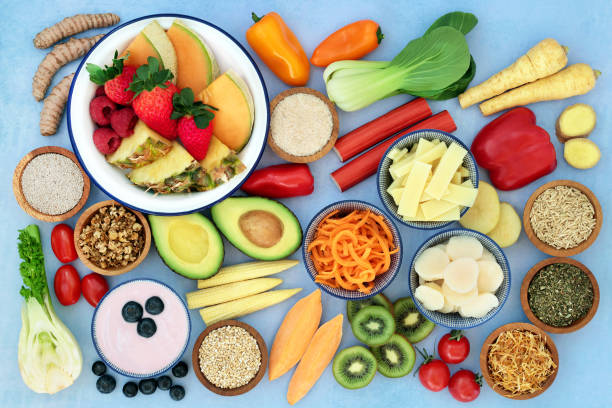Gastroesophageal Reflux Disease (GERD) is a chronic digestive condition where stomach acid frequently flows back into the esophagus, causing discomfort and symptoms like heartburn, regurgitation, chest pain, and difficulty swallowing. One of the most effective ways to manage GERD is by making smart dietary and lifestyle choices. A GERD diet focuses on reducing triggers, soothing the digestive system, and preventing acid reflux episodes. So, see below the GERD Diet meal plan, what to eat, and what not to eat.
Understanding GERD and Its Dietary Connection:
GERD occurs when the lower esophageal sphincter (LES), the muscle that acts as a valve between the esophagus and stomach, weakens or relaxes inappropriately. Certain foods and habits can worsen reflux, while others may help strengthen digestion and minimize symptoms. Following a GERD diet can help control symptoms naturally and reduce dependence on long-term medication.
Foods to Eat on a GERD Diet:
- Bananas, melons, apples, pears (non-citrus fruits)
- Leafy greens, broccoli, green beans, zucchini, cucumbers, sweet potatoes
- Oatmeal, brown rice, quinoa, whole-grain bread/pasta
- Skinless chicken, turkey, fish (grilled/baked), tofu, egg whites
- Nuts, seeds, olive oil, avocados (moderation)
- Herbal teas (chamomile, ginger)
- Low-fat dairy or plant-based alternatives
Foods to Avoid on a GERD Diet:
- Citrus fruits: oranges, lemons, limes, grapefruits, pineapple
- Spicy foods: chili peppers, hot sauces, curries
- Fatty/fried foods: burgers, French fries, fried chicken, processed meats
- Chocolate and peppermint/mint
- Coffee, caffeinated drinks, soda, carbonated beverages
- Alcohol (wine, beer, spirits)
- Full-fat dairy (cream, cheese, butter)
Lifestyle Tips Along with the GERD Diet:
Diet plays a key role, but lifestyle changes are equally important in managing GERD:
- Eat smaller, more frequent meals instead of large portions.
- Avoid lying down immediately after meals; wait at least 2–3 hours.
- Elevate the head of your bed to prevent nighttime reflux.
- Maintain a healthy weight, as excess abdominal fat can increase pressure on the stomach.
- Stay hydrated, but avoid drinking large amounts of water during meals.
- Practice mindful eating, chewing food thoroughly, and eating slowly.
Sample GERD-Friendly Meal Plan:
| Meal Time | Food Options | |
|---|---|---|
| Breakfast |
| |
| Mid-Morning Snack |
| |
| Lunch |
| |
| Afternoon Snack |
| |
| Dinner |
| |
| Evening Snack |
|
Benefits of Following a GERD Diet:
A GERD diet is more than just avoiding heartburn-triggering foods — it is a structured eating pattern that supports overall digestive wellness. By making thoughtful food choices and following GERD-friendly habits, individuals can experience multiple health benefits.
Reduces Heartburn and Acid Reflux Symptoms:
The most immediate benefit of a GERD diet is the reduction of heartburn, regurgitation, and discomfort. Avoiding trigger foods like fried meals, caffeine, and citrus helps prevent acid from flowing back into the esophagus.
Promotes Better Digestive Health:
Whole grains, vegetables, and lean proteins included in the GERD diet support healthy digestion, prevent bloating, and regulate bowel movements. This helps the digestive system function more efficiently.
Prevents Esophageal Damage:
Chronic GERD can lead to complications like esophagitis, Barrett’s esophagus, or strictures. Following a GERD diet reduces acid exposure to the esophagus, lowering the risk of long-term damage.
Improves Sleep Quality:
Nighttime reflux is a common concern in GERD patients. A diet that avoids late heavy meals, caffeine, and alcohol can significantly improve sleep quality by preventing reflux while lying down.
Helps Maintain a Healthy Weight:
The GERD diet emphasizes portion control, low-fat meals, and nutrient-dense foods. This helps with weight management, which is important since excess abdominal fat increases pressure on the stomach and worsens reflux.
Reduces Dependence on Medications:
While medications like antacids and proton pump inhibitors (PPIs) are commonly prescribed for GERD, long-term use may have side effects. A GERD diet can help manage symptoms naturally, reducing the need for continuous medication.
Supports Long-Term Lifestyle Changes:
Unlike temporary fixes, a GERD diet encourages sustainable eating habits that not only help with reflux but also improve overall health, energy levels, and digestion.
Conclusion:
A GERD diet is not about strict restrictions but about finding balance and identifying personal triggers. By focusing on whole, low-fat, and non-acidic foods while avoiding known irritants, you can significantly reduce reflux episodes. Pairing these choices with lifestyle modifications ensures long-term relief and supports overall digestive health.

